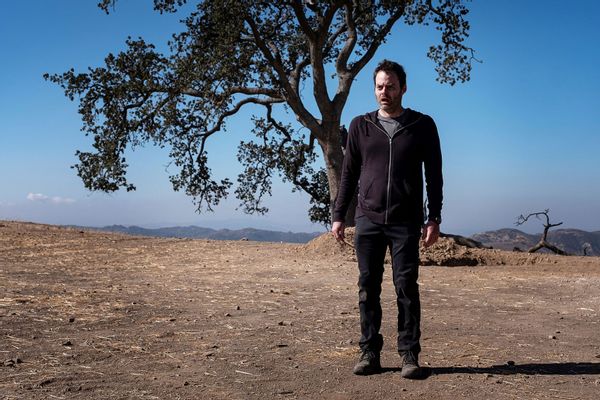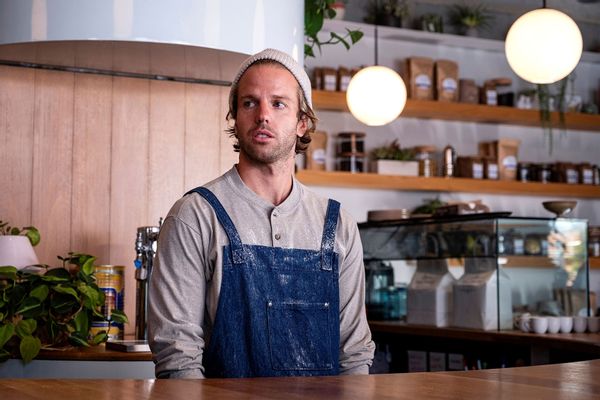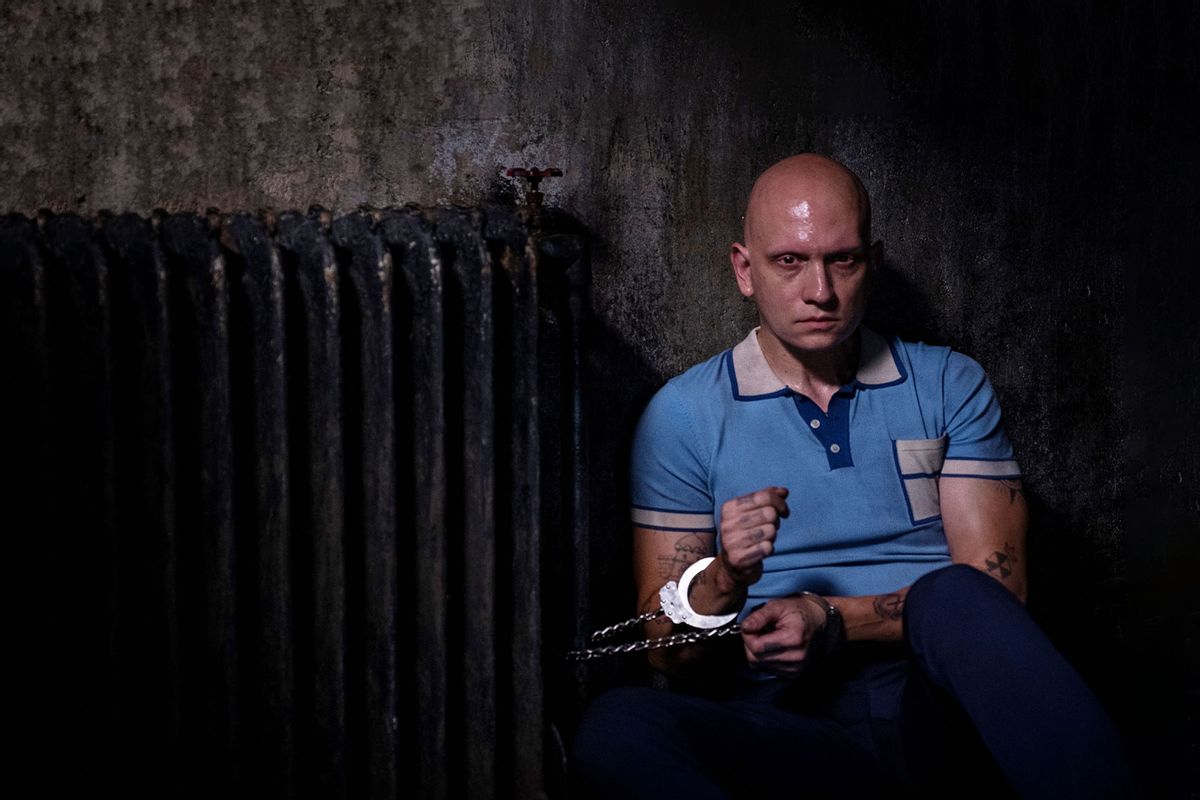Bill Hader and Alec Berg hinted at where "Barry" was headed when the title character, looking more haggard than ever, turned a hit into an impulse kill in the opening scene. Barry Berkman's (Hader) inability to shed his past life as a contract killer has finally caught up with him, an inevitability accelerated by his former handler Stephen Root's Monroe Fuches. At the end of a season spent dodging the vengeful loved ones of the people he's killed, both Barry and Fuches are getting what's coming to them.
So is Gene Cousineau (Henry Winkler), whom Barry spared in exchange for his silence, only to find his acting career in ascent. That outcome is as improbable as Barry's love Sally (Sarah Goldberg), getting her own TV show . . . which she lost, leading to a career implosion. The only thing the audience couldn't see coming is Sally getting her hands bloody too, taking out her rage on an attacker who came for Barry and found her beside him.
"Barry is kind of f**king everyone's life up, so to speak," Anthony Carrigan, the actor behind audience favorite NoHo Hank, tells Salon. For once, Hank's life is the only one Barry doesn't directly ruin in some way this season. Instead Hank got to enjoy a sweet romance with his one-time Bolivian cartel rival Cristobal Sifuentes (Michael Irby), only to have his hopes dashed when Cristobal's vengeful wife reclaimed Hank's love and whisked him back to Bolivia.
RELATED: "Barry" returns three years later and is funnier and darker than ever
Emboldened by love, or perhaps naïveté, Hank blindly followed Cristobal there only to end up chained to a basement radiator and, in a terrifying turn, was forced to fight for his life. Carrigan's finale subplot resolves with Hank breaking from his cell and improbably killing some unseen wild beast, before stumbling upon Cristobal at the center of a bizarre torture scene. The weird part is, Hank's ending turns out to be the most optimistic of all of them, although it's unclear whether Cristobal is OK.
Carrigan, however, is thrilled to have gotten a chance to expand his Chechen mobster into much more than the show's much-loved comic relief. This season's closer shows Hank as a survivor driven by passion as opposed to a happy-go-lucky bungler who somehow manages to survive by accident. In our conversation we talk about how much this season changes Hank, what it was like to film that surreal escape and rescue, and whether there's anything to be read in the exchange between the heartbroken mobster and this season's single episode breakout delight, a wise and profoundly stoned beignet baker named Mitch (Tom Allen).
This interview has been edited for length and clarity.
In the finale NoHo Hank is the only one who has a . . . well I can't really call it a happy ending, but I would say he can see little bit of hope while everybody else is, you know, either in jail or fleeing the law.
Sure, yeah.
I've seen a couple of interviews where you said that Bill Hader hinted that would be the case at the beginning of the season. Do you see it as a positive ending for you and Cristobal, given the circumstances?
"This ... wasn't supposed to be cool whatsoever. It was messy, it was clumsy, and it was terrifying."
Given the circumstances? Yeah, I think there is a lot of positivity in the sense that he kind of pulled off something that was incredible, where the odds were stacked against him. He literally showed up to Bolivia, not knowing where he was going, saying "Cristobal Sifuentes" out loud in the streets in hopes that he was going to find where his love had been kidnapped and taken. And he goes through this gauntlet of sorts in order to get to his love. That said, it is a positive ending, but I think it certainly has taken a toll on him.
This season placed everybody on separate tracks, so Hank only crossed paths with Barry on a very limited basis. What was your impression of how the season came together and how the overall story evolved?
Well, it's one of those things that's always takes me by surprise, because you look at each of these characters, on whatever track they're on. And on their own, you couldn't possibly imagine how they could be in the same story as everyone else. Right?
They're all so distinct and unique. And each of these storylines is just so radically different. However, when you see them all come together, it just fits so nicely. You see so many parallel themes, and you start to kind of connect some dots in terms of how Barry is kind of f**king everyone's life up, so to speak.
 Bill Hader in "Barry" (Merrick Morton/ HBO)
Bill Hader in "Barry" (Merrick Morton/ HBO)
At the same time, it occurs to me as I'm looking on the finale, that out of all the existing main characters, NoHo Hank may be the only one that could be in a position to save Barry from the mess he's in.
I mean, who knows? That remains to be seen. But yeah, Hank, up to this point, has retained his buoyancy. But who knows how long that can last?
Hank has failed upward throughout the show, and his fecklessness has, in a very real way, saved his life a couple of times. And then at the very end with Cristobal, he finds a way to be heroic. From the outside, if you didn't know Hank, he kind of looks like a genius: getting captured, breaking out, taking down this drug lord's daughter and saving Cristobal. He looks like a great man of action. Did you talk about Hank in this scene finding his worth and his, I guess, "quality," to go all "Lord of the Rings" about it?
Yeah. Love the reference. You know, I think that it was very intentional to have Hank, in his usual idealistic way, try to just wander in and hope it will all work out. In Hank's mind he was going in a very kind of like "Romancing the Stone"-type way to get the love of his life back. And he's met with this cold harsh reality of consequences. He's been met with those consequences before, like on the bus that was lit on fire with him on with him inside [in Season 2]. But at that time, he had people to save him. At this point, he's on his own.
So yeah, it was talked about that something lights up inside of Hank. It's pure survival from that point on, which is why it was very intentional that there were no gags, there were no bits. This wasn't supposed to be funny, and this wasn't supposed to be an action sequence, in terms of him getting out. It wasn't supposed to be cool whatsoever. It was messy, it was clumsy, and it was terrifying.
That really fits with what was going on with everyone else too.
Yeah.
Want great food writing and recipes? Subscribe to Salon Food's newsletter, The Bite.
"Barry" is a strange show, in that the further it gets into its run, there are wildly funny sequences that are actually really dark. It invites you to laugh at the absurdity of some terrible situations more than its gags.
I do think that the show from the very beginning has done a wonderful job of subverting the audience's expectations in terms of what is comedic, and what is violent or graphic. And that kind of expectation as to what the tone will strike is, I think, what what keeps the audience pretty sucked in. I think that's an intentional move on the creators' part, just to really mess with the audience. You really don't know whether you're going to get something comedic, or you're going to get something kind of horrifying
They play with the audience's expectations, but it's not in like a masturbatory way. There is actually a payoff. There is a real kind of catharsis to what they're doing. It's intentional.
You've said that everything's intentional. So let's talk about Mitch the Beignet Guy. He's this character who dropped into the show that everybody instantly loved, in the episode where he was featured. One thing that I noticed when I rewatched is that Hank is the only one who he didn't just give advice to. He gave an invitation to him, which was strange. Have you been told that there's a reason for that?
Oh, that I'm not sure of. Obviously Mitch the Beignet Guy is like, such an incredible character and really stood out. And I think, you know, it's kind of amazing that Hank comes to him just blubbering and in tears, and the fact that he wants to open up a franchise with him is like, "What?" Who knows? I would be all in for that storyline. From your mouth to Bill's ears!
 Tom Allen in "Barry" (Merrick Morton/ HBO)
Tom Allen in "Barry" (Merrick Morton/ HBO)
To be clear, I'm not asking if we going to see Hank open a franchise with Mitch. Don't get me wrong, that would be great. The beignets could be dusted in cocaine. Why not? But the question is more about the fact that when you look back, you kind of realize that everything he said was right.
Yeah.
That got me to thinking about how your character is portrayed this season, in that there's definitely kind of a halo of luck that buoys Hank. And I was wondering if that was a reaction to that, since Hank seems to be in the right place when it's the wrong time for everybody else.
That's true. That's true. But I mean, I think also that although he is the head of a very serious crime syndicate, he has honorable intentions, and he's really trying his best to kind of just do what is right. And yeah, and the role of Mitch the Beignet guy as just the kind of voice of reason is something that ties that whole episode together quite nicely.
"This season was extremely rewarding in that I got to see this new side of Hank."
And there's growth for Hank too from the beginning of the season, when he and Cristobal are in bed together and Cristobal says very sadly, "I lost all my buddies." And Hank's says, "Yeah, I lost all my buddies too," and seems a little more casual. In some ways that seems to fit his character where he's very kind of nonchalant at the darkest things. But I'm wondering if that's changed now, based on everything that happened to him and Cristobal?
I certainly think that element of being aloof to all of those dark things – or even, you know, the luxury of not having to get his own hands dirty, or seeing or facing all these really horrific things – that time, I do think is at an end because he was almost killed. He witnessed something truly just atrocious. In the love of his life being being tortured in such a way. That sequence of survival and of saving the love of his life certainly, I think, damaged him.
That was a very elaborate scene – featuring him escaping, shooting what sounded like, what, maybe a lion? Then coming upstairs and witnessing this, what was a very almost David Lynchian sequence there.
Yeah, it was extremely rewarding, but it was also very challenging.
In what way?
Well, pretty much most of it is dependent on Hank just envisioning what is going on on the other side [of the wall] and not knowing what is happening to his best friends. And ultimately, the imminent threat that is ultimately trying to get to him . . . It's an extremely heightened scene. So it required a lot of a lot of energy. And a lot of intensity.
How easily were you able to shake it off afterwards?
Oh, I can shake it off. I slept well, that night, for sure, because it was an exhausting sequence and an exhausting process. But, for the most part, I leave work at work. Actually, I leave work during the take. In between takes, I just take it easy and joke around. I like to just keep it light.
I'm guessing that Season 4 hasn't really been broken yet. But what are you hoping to see with your character next season?
Well, this season was extremely rewarding in that I got to see this new side of Hank: who he was in a relationship, who he was behind closed doors, the lengths he was willing to go to, to protect the love of his life, also in response to running and hiding in the closet, this aspect of shame. I'm just really excited to continue to flesh this character out and find new elements to bring to the table. I imagine that will be the case. So that's very exciting.
All three seasons of "Barry" are available to stream on HBO Max.
More stories like this:
- "Barry" star OK if Sally is "a monster"
- "Barry" and The zen of Henry Winkler
- "Barry": Bill Hader's darkness shines



Shares